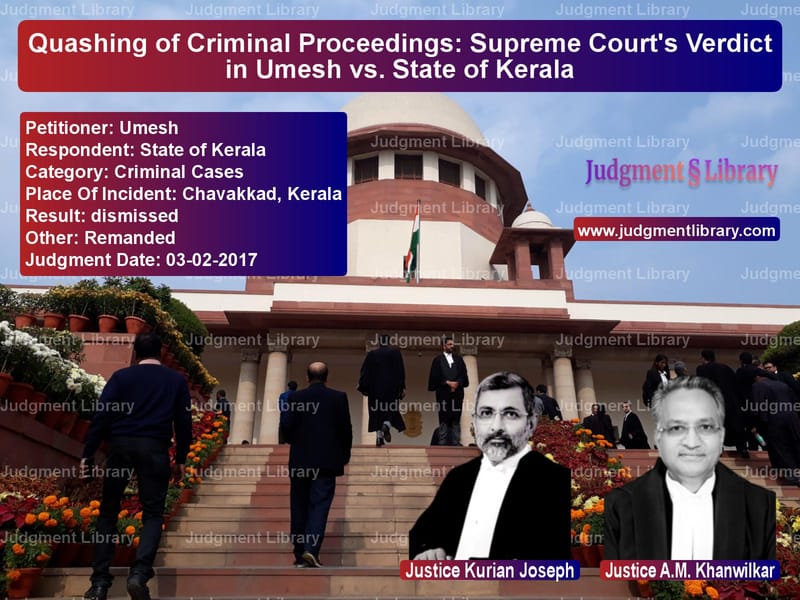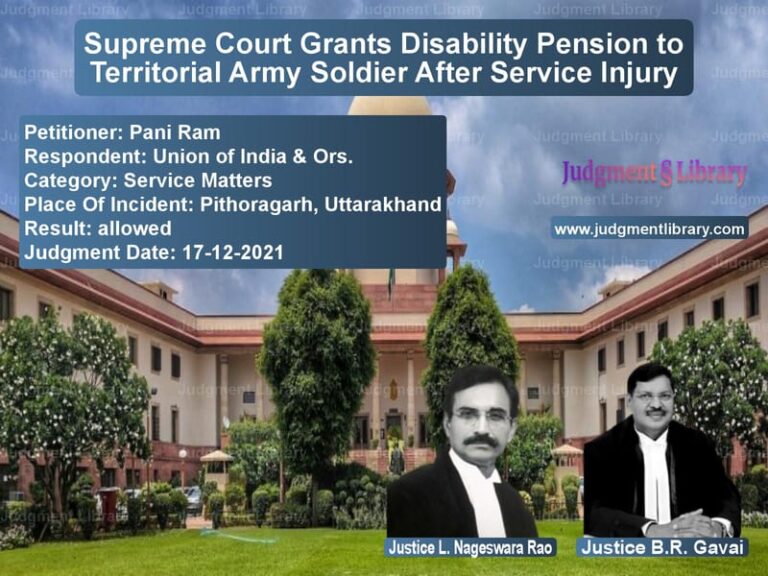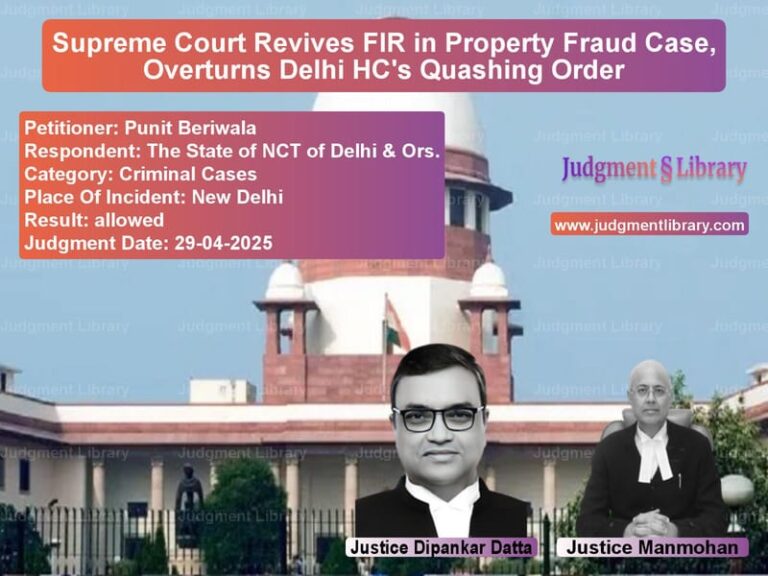Quashing of Criminal Proceedings: Supreme Court’s Verdict in Umesh vs. State of Kerala
The Supreme Court of India, in its judgment dated February 3, 2017, delivered an important ruling in the case of Umesh vs. State of Kerala. The case revolved around the appellant’s plea to quash criminal proceedings pending before the Judicial Magistrate, First Class, Chavakkad, under CC Nos. 289/1996 and 280/1996. The Supreme Court rejected the appellant’s plea to quash the proceedings but granted him relief by allowing him to seek discharge under Section 239 of the Code of Criminal Procedure (Cr.P.C.).
This ruling clarifies the legal position regarding the continuation of criminal proceedings against an absconding accused after co-accused have been acquitted or convicted.
Background of the Case
The appellant, Umesh, was charged as Accused No.5 in two criminal cases, CC No. 289/1996 and CC No. 280/1996, pending before the Judicial Magistrate, First Class, Chavakkad, Kerala. The cases were registered against multiple accused, and the trial proceeded against them.
However, since the appellant was not available for trial, the court separated his case from the other accused, and the trial continued against them. The outcome of the two trials was as follows:
- In CC No. 289/1996, the first accused was convicted, while the rest of the accused were acquitted.
- In CC No. 280/1996, all the accused were acquitted.
Following these developments, Umesh filed a petition before the Kerala High Court, seeking to quash the criminal proceedings against him. The High Court refused to quash the cases, prompting him to approach the Supreme Court.
Appellant’s Arguments
Umesh’s counsel argued:
- Since the other accused in the cases were either acquitted or convicted, continuing the proceedings against him was unnecessary harassment.
- There was no evidence against him, and forcing him to face trial would be a waste of judicial time.
- The criminal proceedings should be quashed to prevent undue hardship.
State’s Arguments
The prosecution opposed the appellant’s plea, stating:
- The appellant had absconded and had not faced trial along with the other accused.
- It was for the Judicial Magistrate to decide whether there was sufficient evidence against him.
- The appellant could not bypass the trial process merely because his co-accused were acquitted.
Supreme Court’s Ruling
The Supreme Court declined to quash the criminal proceedings but allowed the appellant to seek discharge under Section 239 of Cr.P.C.. The Court ruled:
“Even if all contentions taken by the appellant are taken on their face value, it is for the Magistrate concerned to consider those contentions in an appropriate application filed under Section 239 of the Cr.P.C.”
The Court directed the appellant to surrender before the Judicial Magistrate, First Class, Chavakkad, within four weeks. Upon surrendering, the appellant was granted bail on furnishing a bond of Rs. 50,000 with two solvent sureties.
The Court further stated:
“We direct the learned Magistrate to consider the applications, if any filed, having regard to the contentions taken by the appellant and dispose of the same, in accordance with law.”
Impact of the Judgment
This ruling has several important legal implications:
- It establishes that an absconding accused cannot claim quashing of proceedings merely because co-accused have been acquitted.
- The Magistrate has the authority to decide the merits of discharge applications under Section 239 of Cr.P.C.
- The ruling ensures that due process is followed while also protecting the accused’s right to seek discharge.
Conclusion
The Supreme Court’s verdict in Umesh vs. State of Kerala reinforces the principle that all accused must face legal proceedings unless there is clear legal ground for quashing charges. The judgment ensures that judicial scrutiny is not bypassed while also offering relief to the accused through legal remedies under Cr.P.C.
Don’t miss out on the full details! Download the complete judgment in PDF format below and gain valuable insights instantly!
Download Judgment: Umesh vs State of Kerala Supreme Court of India Judgment Dated 03-02-2017.pdf
Direct Downlaod Judgment: Direct downlaod this Judgment
See all petitions in Bail and Anticipatory Bail
See all petitions in Fraud and Forgery
See all petitions in Attempt to Murder Cases
See all petitions in Judgment by Kurian Joseph
See all petitions in Judgment by A M Khanwilkar
See all petitions in dismissed
See all petitions in Remanded
See all petitions in supreme court of India judgments February 2017
See all petitions in 2017 judgments
See all posts in Criminal Cases Category
See all allowed petitions in Criminal Cases Category
See all Dismissed petitions in Criminal Cases Category
See all partially allowed petitions in Criminal Cases Category







